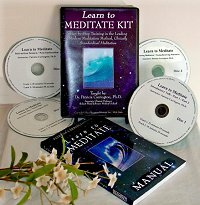Dr. Patricia Carrington's award winning meditation technique CSM (Clinically Standardized Meditation) is a clinically sensitive meditation method developed by the Medical Department of New York Telephone Company and used by numerous medical institutions, organizations, and individuals worldwide. For information click here.
Tips for Success in Meditating
Taking Vacations from Meditating
Patricia Carrington, Ph.D.
Author of “The Book of Meditation”
In our previously referred to meditation questionnaire, one of the questions asked was whether meditators had ever taken a ‘vacation’ from meditation. If they did so, how long did they do so and were they later able to resume meditating regularly?
More than half the meditators who answered reported having temporarily stopped meditating at some point – the longer they had been meditating the more likely meditators were to have taken time off. Sometimes these ‘vacations’ were only a day, a few days, or a week in length; sometimes several months or longer. In a few cases they involved stopping meditation for a year or more. The people involved had all spontaneously resumed meditation afterward, and most of them said they were able to be fairly regular in their practice of meditation after the vacation. Occasionally, though, they reported having had difficulty resuming the practice because they felt ‘guilty’ for having stopped.
Just why people feel they need these breaks from meditation is an interesting question. There may be a number of different reasons why they occur and why at times they may even be helpful.
Certain people are aware of why they temporarily stop meditating. A patient of mine who stopped for three months was in the process of dissolving a marriage which had ended two years before, but which only now did she have the strength to terminate legally. During this period of her life she stopped meditating, although she considered the practice extremely valuable to her and one of the contributing factors in her decision to make a new life for herself. She reported that meditation had increased her sense of independence and her wish to be entirely on her own. Since it was not yet feasible to put these positive plans into action, the meditation sessions during this interim period left her with a painful sense of frustration. To avoid this, she simply abandoned meditation temporarily. She said that the knowledge that meditation was still ‘there’, however, should she really need it, gave her security.
Other people stop meditating temporarily because another activity is substituting for the meditation. Some vacationers, for example, find that meditating in natural surroundings is an exalting experience, but others find the opposite. For the latter, fragrant mountain air, the whispering of a brook, the smell of the sea or a pine forest, or other experiences which naturally bring about the meditative mood, are so compelling that they find that they no longer use formal meditating while on their holiday, but will usually resume regular meditation on their return to ‘civilization’.
Similarly, at certain points during their artistic work, some people will find so much excitement in the act of creation that they may temporarily forget to meditate or may feel that meditation slows down their intense creative drive. Such people may stop meditating during the height of their productivity. A number of creative people, however, report the opposite, as we shall see when we consider meditation’s contributions to the creative process. For these people, meditation seems to enhance their work, freeing and strengthening their creative drive. Clearly this is an individual matter, sometimes not even predictable for the same person from one project to the next.
An occasional meditator may also stop temporarily because he finds that when under heavy stress, meditation increases anxiety, rather than being calming. As one student puts it, ‘At times I’ve stopped meditating when I’ve been particularly stressed – when I’m under too much stress meditation can be very annoying – and so I just can’t meditate at such a time.’
Stopping is usually the only solution for such a person at this point. Merely reducing meditation time under such circumstances seems to do little. Closely related to this reaction is one described by a CSM meditator who found that when she was under severe emotional stress due to the impending death of a parent, her meditations lost their value for her. She now could not fit meditation comfortably into her pressured schedule and was finding herself becoming irritated and tense during meditation instead of calmer. In order to avoid what is known as ‘counter conditioning’, whereby meditation might become a ‘signal’ for tensing up, she stopped meditating entirely during this period. After her parent’s death and following a period of mourning, this woman was able to resume meditating with the same beneficial results she had originally obtained.
Many of the same reasons that lead people to stop meditating entirely cause others to take vacations from it. Various blocks to meditating, foremost among which is guilt at allowing oneself to have pleasure, can result in frequent intermittent breaks from meditation. When this happens it is usually the reflection of an internal struggle; a wish to meditate and enjoy the benefits of this practice is counterbalanced by an equally strong need to escape from meditation and the anxiety or guilt it entails. The solution is ‘on-again, off-again’ meditation. The person meditates until too much guilt accumulates, takes a vacation from it until the guilt subsides, and then starts again with a temporary feeling of wellbeing – until guilt builds up once more.
Other people may stop not because of any deep-seated problems but rather to establish a sense of independence in relation to the practice. They have a need to prove to themselves that they are not rigidly controlled by the routine of meditation but that they can freely elect to practice it. A student expresses this clearly: ‘Sometimes meditation becomes too much of a routine – too confining – too restrictive – so on occasion I have stopped for a few days.’
For the fairly sizable number of people who occasionally stop meditation in order to establish their sense of independence from the practice, these breaks are often effective and do establish the meditator’s autonomy. Under such circumstances, the vacation can be considered to have been a healthy move. Essentially we should never meditate because we have to, but because we want to. If we have to stop meditating temporarily to make this point clear to ourselves, then that is a wise decision.
Some people may have to take more radical steps to restore power to their technique, however. Shifting temporarily or even permanently to a different type of meditation may be for them the only answer to this problem. Even if we use a different meditational technique, only occasionally as a change of pace, our original technique may be ‘recharged’, lending it new life. Many people have a strong emotional attachment to the meditational device they were originally taught to use. This is understandable, for the device can become in time an intimate reflection of our deeper self. We therefore usually gravitate naturally back to it when it is sufficiently enlivened so that its effectiveness has been restored. The process is like that of recharging a battery which has run down. There is no need to throw away the battery, but sometimes a special process is required to make it work again.
Another constructive reason for vacations from meditation is a phenomenon which is recognized by educators. If someone studies a subject such as a foreign language for a number of months, and then stops studying it or even thinking about it, it is not unusual to find on a test taken several months later, that the person has an even better grasp of the subject than he did directly after the period of intense conscious effort. The implications of this are that some form of learning has been going on during the ‘rest’ period. By stopping the active process of forcing ourselves to learn, we sometimes allow learning to consolidate, to become a natural part of us; something which would not happen if we were to keep our ‘nose to the grindstone’ all the time. Do people continue to develop from meditation even during those intervals when they may not be actively practicing it?
This does not seem to be the case with the physical results obtained. When hypertensive subjects who have reduced their blood pressure through meditation stop meditating, their blood pressure gradually starts to rise again, showing that the effects of meditation are wearing off. This process can only be reversed by resuming meditation.
On a psychological level, however, it is not at all certain that the effects wear off in this manner. Some evidence suggests that the meditative attitude may continue as an important part of one’s life, even if one takes a vacation from meditation. Meditators who are not currently meditating will report that they nevertheless find themselves spontaneously entering meditative moods during the day when formerly they might have been tense and over-directed in their attitudes. Meditation can change the way a person lives her life in a rather fundamental respect, a change which is not likely to be easily reversed.
A final reason for vacations from meditation is the fact that any routine, no matter bow beneficial, can be wearing after a while. We sometimes need a vacation from the best things or the most important people in our lives. Time spent away from them can result in our being all the more enthusiastic about them when we return. Perhaps this is so with meditation. Most people come back to meditation after their ‘time off’ apparently no worse for the experience and sometimes with a newfound sense of freedom about their meditation.
Certainly, given the frequency of vacations from meditation in the general population of meditators, no one needs to feel guilty about taking some time off or feel that because she has done so, she is a ‘failure’ at meditation. Guilt about such a vacation can make for serious difficulties, even if the vacation itself does not, because the guilt makes the meditator define oneself as a failure. This in turn is likely to make her hostile to the entire endeavor of meditation. It is those people who cannot forgive themselves for taking a vacation from the practice who are most likely to stop meditating permanently following their vacation.

